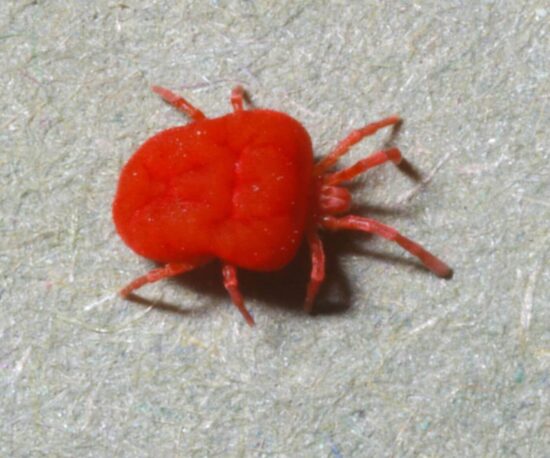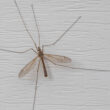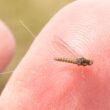Nothing ruins a beautiful day outside quite like tiny, invisible bugs that leave you covered in itchy red bumps. Chiggers are microscopic mites that love to hang out in yards, waiting for their next victim to walk by. These pesky little creatures are most active when temperatures hit between 77 and 86 degrees, making late spring through early fall prime chigger season.
The good news is that learning how to get rid of chiggers in your yard naturally doesn’t require harsh chemicals that could harm your family, pets, or the environment. Natural methods can be just as effective as toxic sprays, and many of them use common household items you probably already have.
Chiggers are actually the larval stage of trombiculid mites. While adult chiggers don’t bite humans, the tiny larvae attach to your skin and inject digestive enzymes that break down skin cells. This creates those incredibly itchy bumps that can last for weeks. The key to getting rid of chiggers in your yard is understanding their preferred habitat and eliminating the conditions they love most.
Here are a few natural methods to reclaim your outdoor space from these unwanted visitors.
1. Maintain Proper Lawn Care and Yard Hygiene
The foundation of any successful chigger control plan starts with good yard maintenance. Chiggers love tall grass, overgrown vegetation, and cluttered areas where they can hide and wait for hosts.
Keep your grass cut short, ideally below 3 inches. Mow frequently during the growing season, especially around areas where your family spends time like patios, play equipment, and pet houses. Regular mowing removes the protective cover chiggers need to survive.
Remove all debris from your yard including leaf piles, wood stacks, and overgrown vegetation. These areas create the perfect damp, shady environment that chiggers prefer. Pay special attention to areas under decks, around foundations, and in corners where debris tends to accumulate.
Aerate your lawn annually to improve air circulation and reduce moisture buildup. Chiggers thrive in humid conditions, so anything you can do to increase airflow and reduce dampness will make your yard less appealing to them.
Trim back shrubs, bushes, and any overhanging branches that create shaded areas. Chiggers don’t like direct sunlight, so opening up your yard to more sun exposure naturally deters them.
2. Apply Diatomaceous Earth
- Kills fleas, ants, roaches, and more
- Includes powder duster for easy, targeted application
- Works indoors and outdoors, long-lasting when dry
- 100% pure, food-grade, safe around pets and kids
Food grade diatomaceous earth is one of the most effective natural weapons against chiggers. This powdery substance comes from fossilized diatoms and works by drying out the chiggers’ protective outer layer.
Apply about 5 pounds of diatomaceous earth per 1,000 square feet of yard space. You can sprinkle it directly on problem areas or mix 4 tablespoons with a gallon of water to create a spray that reaches hard to access spots.
Focus your application on areas where chiggers are most likely to hide: tall grass, weedy spots, and shaded areas under bushes. Don’t spread it across your entire yard, as it can also harm beneficial insects like bees and ladybugs.
Always wear protective gear including gloves, goggles, and a dust mask when applying diatomaceous earth. The fine particles can irritate your lungs and skin if you breathe them in or get them on your body.
Reapply after heavy rain, as water washes away the effectiveness of diatomaceous earth. For best results, apply during dry conditions and give it time to work before watering your lawn.
3. Use Sulfur Powder Treatment
Sulfur has been used for chigger control for generations, and it remains one of the most reliable natural methods available. Unlike other treatments that kill chiggers, sulfur works as a repellent that keeps them away from treated areas.
Broadcast 5 pounds of sulfur per 1,000 square feet of lawn area. Because chiggers live in clusters, you need to apply sulfur heavily to be effective. Use a seed spreader for even coverage across larger areas.
Powder sulfur works better than granulated forms but doesn’t last as long and can be messier to apply. The strong smell of sulfur may be unpleasant for humans, but it’s exactly what keeps chiggers away.
Important safety note: sulfur can be toxic to pets if they eat it. If you have dogs, cats, or other animals that spend time in your yard, choose a different method to avoid accidental poisoning.
You can also dust your clothing and shoes with sulfur powder before going outside. This personal protection method has been used successfully for decades by gardeners and outdoor workers.
4. Install Cedar Oil Spray Systems
Cedar oil provides a natural, pleasant smelling solution for how to get rid of chiggers in your yard naturally. The strong scent of cedar acts as a powerful deterrent that chiggers find unbearable.
Start by spraying your lawn with a cedar oil based product twice, spacing the applications two weeks apart. After this initial treatment, continue with monthly applications to maintain protection throughout chigger season.
Many commercial cedar oil products are available, including ready to use sprays and concentrates you mix yourself. Popular brands include Wondercide and Cedarcide, both of which are safe for families and pets.
Apply cedar oil treatments in the early morning or evening when temperatures are cooler. This prevents the oil from evaporating too quickly and gives it time to soak into the areas where chiggers hide.
Cedar oil is completely eco-friendly and won’t harm beneficial insects, birds, or other wildlife. It also has the added benefit of repelling other pests like fleas, ticks, and mosquitoes.
5. Create Essential Oil Barrier Sprays
- Plant-based peppermint oil formula repels pests naturally
- Safe to use around pets, kids, and indoor living spaces
- Great for garages, attics, baseboards, and outdoor areas
- Fresh mint scent with long-lasting protection
Essential oils provide another natural approach to chigger control. Several oils have proven effective at repelling these pests while being completely safe for your family and environment.
The most effective oils for chigger control include lavender, peppermint, tea tree, citronella, and thyme. Research has shown that tea tree oil at 40% concentration provides 100% protection against chiggers.
Lemongrass oil is particularly powerful and is often used in commercial natural repellents. Eucalyptus and geranium oils also work well and have pleasant scents that humans enjoy.
Mix your chosen essential oils with water in spray bottles and apply around your yard’s perimeter and problem areas. Use about 10 to 15 drops of essential oil per cup of water for effective coverage.
Reapply essential oil sprays every 2 to 3 weeks or after heavy rain. The oils break down naturally over time, so regular reapplication maintains their effectiveness.
6. Apply Apple Cider Vinegar Solutions
Apple cider vinegar is an inexpensive household item that doubles as an effective chigger deterrent. The strong, pungent smell repels chiggers and other pests naturally.
Mix equal parts apple cider vinegar and water in a spray bottle. Apply this solution around the perimeter of your yard, focusing on areas where your lawn meets wild or overgrown spaces.
You can also use this mixture for spot treatments in areas where you’ve noticed chigger activity. The vinegar is safe for most plants when properly diluted and won’t harm the environment.
For indoor treatment of items that may have been exposed to chiggers, vinegar solutions work well on clothing, shoes, and outdoor gear. The smell dissipates quickly, leaving no lingering odor.
This method works best when combined with other natural treatments. While vinegar alone won’t solve a serious chigger problem, it’s an excellent addition to your overall control strategy.
7. Introduce Beneficial Nematodes
Beneficial nematodes are microscopic worms that naturally occur in soil and prey on various pest insects, including chiggers. These tiny allies provide biological control without any chemicals or environmental harm.
Purchase a triple blend of beneficial nematodes that includes Heterorhabditis bacteriophora, Steinernema carpocapsae, and Steinernema feltiae. This combination targets the widest range of soil dwelling pests.
Mix the nematodes with water according to package directions and apply to moist soil. They work best when soil temperatures are between 44 and 86 degrees Fahrenheit.
Keep the treated area moist for two weeks after application. Beneficial nematodes need moisture to move through the soil and locate their prey effectively.
These helpful organisms provide long term pest control and won’t harm earthworms, beneficial insects, or other important soil life. They continue reproducing and hunting pests for months after application.
8. Plant Chigger Repelling Companion Plants
Nature provides its own chigger control in the form of plants that naturally repel these pests. Strategic planting around your yard creates living barriers that chiggers avoid.
Marigolds are particularly effective at keeping chiggers away. Plant them around patios, play areas, and along the borders of your yard where chiggers are most likely to enter.
Other excellent chigger repelling plants include catnip, lavender, and chamomile. These perennial plants come back year after year, providing ongoing protection with minimal maintenance.
Plants in the mint family, including peppermint and spearmint, have strong aromas that repel chiggers and other arachnids. However, mint spreads aggressively, so plant it in containers to prevent it from taking over your garden.
Lemongrass and sagebrush also work well as natural deterrents. You can even dry and crush geranium leaves to create a powder that repels chiggers when sprinkled around problem areas.
9. Improve Drainage and Reduce Moisture
Getting rid of chiggers in your yard often comes down to eliminating the damp conditions they love. Chiggers thrive in areas with high moisture and poor air circulation.
Remove all sources of standing water from your yard including puddles, clogged gutters, and overfilled bird baths. Check your sprinkler system for leaks and make sure it’s functioning properly without creating soggy spots.
Grade your yard to ensure proper drainage away from your house and outdoor living spaces. Areas where water collects become prime chigger habitat, so redirect water flow whenever possible.
Increase sunlight exposure by trimming trees and large bushes that create heavy shade. Chiggers prefer dark, damp areas and will avoid sunny, well drained spots.
Install drainage solutions like French drains or dry creek beds in areas where water naturally collects. These improvements not only reduce chigger habitat but also protect your property from water damage.
10. Remove Wildlife Food Sources and Habitat
Chiggers prefer to feed on small mammals, birds, and reptiles rather than humans. By making your yard less attractive to wildlife, you reduce the chigger population naturally.
Remove bird feeders, especially during peak chigger season. While birds are wonderful, their presence attracts the small mammals that chiggers prefer as hosts.
Secure trash cans with tight fitting lids and clean up any fallen fruit from trees promptly. These food sources attract rodents and other small animals that support chigger populations.
Keep pet food indoors and clean outdoor grills thoroughly after use. Food residue attracts animals that bring chiggers into your yard.
Create distance between your house and trees or bushes that provide highways for wildlife. Trim branches that touch your roof or provide easy access to your home.
11. Create Physical Barriers and Mulch Borders
Physical barriers help keep chiggers contained to wilder areas of your property while protecting the spaces where your family spends time.
Use gravel or mulch to create clear borders between maintained lawn areas and wild or wooded spaces. These barriers discourage chiggers from crossing into your yard.
Install low fencing around garden areas and play spaces. While chiggers can’t jump or fly, they have difficulty crossing smooth barriers.
Create clear pathways through your yard using pavers, gravel, or mulch. This reduces the chance of accidentally walking through areas where chiggers might be hiding.
Maintain these barriers regularly by refreshing mulch, clearing debris, and keeping pathway edges well defined. Consistent maintenance prevents chiggers from establishing new colonies.
12. Use Natural Soap and Water Treatments
Simple soap and water solutions provide an easy, safe method for spot treating chigger infested areas. This approach works well for quick fixes and emergency treatments.
Mix a few drops of Dawn dish soap with water in a spray bottle. Apply this solution directly to areas where you’ve noticed chigger activity.
You can also create a vinegar and water spray for similar results. Both solutions are safe for plants and animals when used in small amounts.
These treatments work best for immediate relief rather than long term control. Use them to treat specific problem spots while implementing other methods for overall yard protection.
The soap interferes with chiggers’ ability to move and breathe, while the water washes away existing populations. Reapply after rain or heavy watering.
Conclusion
Getting rid of chiggers in your yard naturally is completely achievable with the right combination of methods and consistent application. These 12 techniques provide safe, effective alternatives to harsh chemical treatments that could harm your family, pets, or the environment.
Remember that successful chigger control starts with understanding their preferred habitat and eliminating the conditions they need to survive. Focus on reducing moisture, removing debris, maintaining short grass, and creating an environment that favors beneficial insects over pests.
The natural approach to how to get rid of chiggers in your yard naturally may take more time and effort than chemical solutions, but the long term benefits make it worthwhile. You’ll create a healthier outdoor environment that your family can enjoy without worry about toxic residues or environmental damage.
Start with the methods that seem most practical for your situation, then gradually add others as needed. With patience and persistence, you can reclaim your yard from chiggers and enjoy your outdoor space throughout the warmer months.




